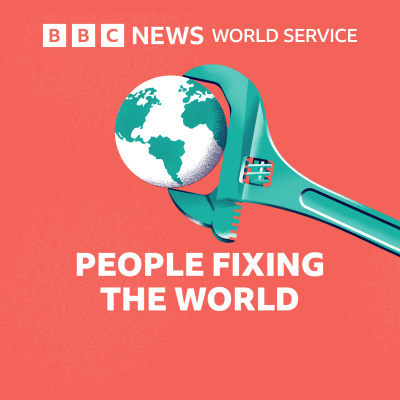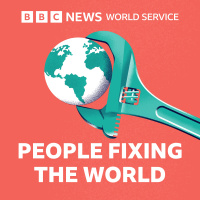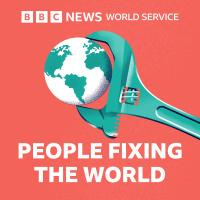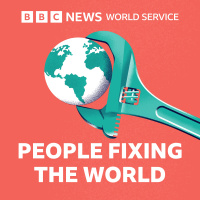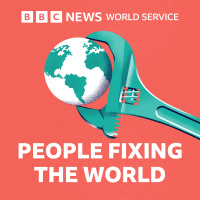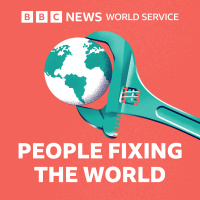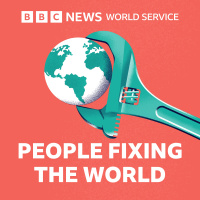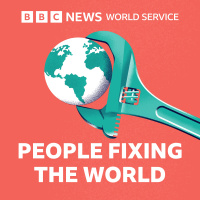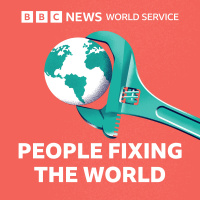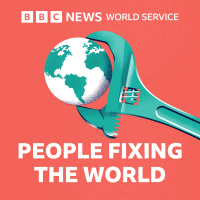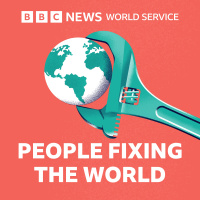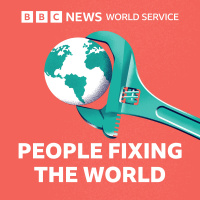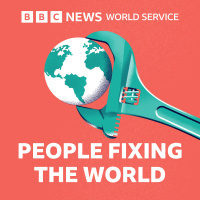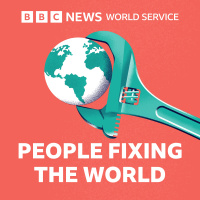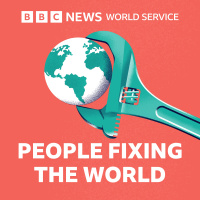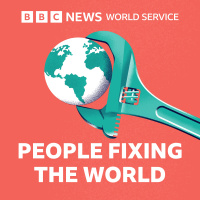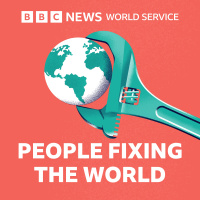Sinopsis
Brilliant solutions to the worlds problems. We meet people with ideas to make the world a better place and investigate whether they work.
Episodios
-
The house that fights malaria
08/02/2022 Duración: 24minMalaria kills more than half a million people per year. We meet the innovators who are using buildings, lights, genes and vaccines to fight the mosquito-borne disease. In Ghana, a young woman has turned her school project into a business, selling lights that electrocute mosquitos and help kids study. In Tanzania, researchers have designed a house with porous walls that diffuse human breath and keep the people inside hidden from mosquitos. In London, scientists are using genetic engineering to reduce female mosquito fertility, aiming one day to make a dent in the wild population. And in Kenya and Malawi, a new malaria vaccine is being tested, offering hope to millions of people. Presenter: Jo Mathys Reporter: Rumella Dasgupta Image: A Star Home (Credit: Star Homes Project)
-
Using VR to change lives
01/02/2022 Duración: 27minVirtual Reality is being used by researchers around the world to change people’s lives – helping them confront their own fears and change how they treat other people.In the UK, a company is using VR to help people with a fear of heights. The automated therapy system puts participants in a virtual multi-story building to help them combat their fear.A team in Israel is experimenting with using VR to change how people on both sides of the conflict feel about the other.And in Spain, a virtual reality simulation is being used in prisons. They’re trying to make people convicted of domestic violence aware of what it feels like to be in the position of their victims.Presenter: Jo Mathys Producer/Reporter: Serena Tarling Image: Someone using a VR headset (Getty Images)
-
How to fight fake health news
25/01/2022 Duración: 23minCould a video game where you pretend to spread Covid misinformation actually make you less susceptible to real-life fake news? Fake news, conspiracy theories and misinformation about health can stop people getting vaccinated, which in turn could cause diseases to spread and ultimately result in people dying. In Sierra Leone, an NGO is educating people about typhoid and malaria by creating audio dramas, and sharing them over WhatsApp. Meanwhile, a team based at Cambridge University in the UK wants to ‘inoculate’ people, to prevent them from believing fake stories if and when they see them in the future. Presenter: Jo Mathys Reporter/Producer: Mark Sedgwick Image: The Go Viral game
-
Making clean water with rubbish
18/01/2022 Duración: 24minA Ugandan chemist has found a way to use old cattle bones and food waste to make clean water.Timothy Kayondo turns the rubbish into activated carbon, which he uses to produce water purifiers. They’re being used in schools and hospitals.It is estimated that one in 10 people on the planet do not have a basic level of access to clean water.In this programme we find out about Timothy’s work and discover more ways people around the world are getting access to safe drinking water.Presenter: Jo Mathys Reporters: Mercy Juma, Celestina Olulode and Tom Colls Producers: Daniel Gordon and Tom Colls Image: Timothy Kayondo
-
Catching up with our solution seekers
11/01/2022 Duración: 24minHow are Covid sniffer dogs, a sturdy bicycle scheme and balloons beaming down the internet getting on? We catch up with a few of the projects featured on our programme to see if they are making progress. In the UK we catch up with the sniffer dogs being trained to detect Covid 19. After promising results from a large trial, they’re onto the next stage of training. Meanwhile Wyson in Zambia has extended his bicycle purchase scheme for rural women and even had a bit of help from a BBC World Service audience member. We find out what happened after US company Loon launched giant balloons designed to beam down the internet to rural Kenya. And we hear from Dhruv Boruah, who has turned his attention from running plastic hackathons to a rather unusual underwater project. Produced and presented by Claire Bates Reporters: Richard Kenny and Tom Colls Image: Dhruv Boruah
-
The forest sound detectives
04/01/2022 Duración: 24minScientists are checking up on the health of forests by analysing the sounds in them. They test their vital signs by measuring the croaks, tweets and hums of resident creatures. If they can hear a full range of animals they can be confident an ecosystem is doing well. However, if gaps start to appear, it’s a sign something is up. Nick Holland hears more about how it works and how it’s being used to strike a balance between the needs of Papua New Guinea’s growing indigenous communities and the need to preserve the biodiversity of the forests they live off. Produced and presented by Nick Holland Image: The Nature Conservancy Repeat - first published 04 May 2021.
-
The moo loo and other stories
28/12/2021 Duración: 23minTraining cows to use the toilet and a bouncy castle that fights climate change are some of the surprising solutions today. Humans have been training animals like dogs and horses for centuries. But how easy is it to train a cow? Well scientists in New Zealand and Germany have been successfully training cows to use a special latrine. The cows get a reward each time they pay a visit. The idea behind it is that by collecting their urine in the latrine, it won't release so much ammonia into rivers and streams. In this programme we are going to look at some unusual solutions to big problems, and solutions to unusual problems you might not know existed. We’ll also hear about a bouncy castle which fights climate change by absorbing CO2, and a project to help people with different size feet find shoes that actually fit. Presenter: Celestina Olulode Reporter and producer: Richard Kenny Image: Dr Matthews (Credit: Dr Caroline Bagshaw)
-
Creating an alternative gig economy
21/12/2021 Duración: 23minMeet the innovators who want to change gig work for the better.When we order a pizza on a Friday night or use a ride-sharing app to get home, it’s likely that the person providing the service is a ‘gig worker’ – a flexible employee who picks their own hours and gets paid per-job.The app-based gig economy provides convenience for consumers - and has become an increasingly important part of the global economy over the last 10 years. Workers can log on and off when they chose – but they are often managed by an absent algorithmic middleman, and don’t have access to basic workers’ rights such as sick pay, holiday pay or an hourly wage.But people around the world think that a fairer approach to gig work is possible – from a co-operative run by ex-delivery riders in London to a blockchain based ride-sharing app launching in India. But can these upstarts provide the flexibility and convenience that both workers and consumers have come to expect?Produced and presented by Craig Langran
-
How to make electricity for your neighbours
14/12/2021 Duración: 25minHundreds of millions of people don’t have access to electricity. But all over the world, people are joining forces to provide a home-grown solution — by setting up their own “microgrids” using renewable energy.We meet the Kenyan man who got so frustrated waiting for his village to be connected to the national power grid that he built his own hydro power station. Using scrap materials and a bicycle wheel he made enough electricity for his own household and many others in the community.We’ll also hear from Bangladesh where individual households with solar panels on their roofs have formed a local network. They sell any spare power neighbours who don’t have the panels. Produced by Daniel Gordon and presented by Mercy Juma. Image: John Magiro
-
Food waste: The solar dryer solution
07/12/2021 Duración: 24minA simple system for saving food and empowering women on the show today. Hundreds of millions of tonnes of food go to waste every year, much of it before it is even sold. This waste is bad for the planet, but also for farmers and consumers.A company in India has found an solution. They collect imperfect produce that would otherwise have been left by farmers to rot and use specially designed solar dryers to remove the water. They then take the dried fruit and vegetables, process it, and sell it on. The benefits of their system go far beyond food waste. By setting up collectives of women in rural India with the machines, they’re transforming the lives and status of a group of people who traditionally struggle to gain economic independence.Chhavi Sachdev goes to see the system in action, finds out who is buying the dried produce and discovers what it actually tastes like. Image: Kavita Gadekar, who uses the solar dryer
-
Ways to save the planet: Using the sun
30/11/2021 Duración: 24minFloating solar panels and a see-through pyramid are the solutions this week. The sun is the ultimate source of energy for life on earth. Harnessing that energy in new ways is a key part of the fight against climate change. This week, we meet two people who had solar power eureka moments and are doing just that. One designed a see-through pyramid that produces hot water for low-income countries. The other opened up new space for solar panels by floating them on the water. We explore these ideas with environment journalist Tom Heap, who joined forces with The Royal Geographical Society to check out the most promising climate change solutions for BBC Radio 4 series ‘39 Ways to Save the Planet’. Image: Faisal Ghani and his solar water heater.
-
The tiny satellites changing how we see Earth
23/11/2021 Duración: 23minCubeSats are small but mighty. They started as an educational toy in 1999, but now help people tackle issues from deforestation in Brazil to modern slavery in Greece.Cheap to make and launch, these tiny satellites’ biggest role is in remotely scanning the Earth. Thousands are whizzing over our heads right now tracking a huge range of stuff - including herds of elephants, coral reefs and volcanic ash clouds.We look at how CubeSats have opened up space to nations and start-up companies and helped usher in a new, commercial, space age.Produced and presented by Claire Bates.Image: A CubeSat (Nasa)
-
The 15-minute city
16/11/2021 Duración: 24minEverything you need on your doorstep: a radical plan to improve our cities. Imagine if everything you needed - your work, leisure and essential services - was just a 15-minute walk or cycle from where you live. With no need to drive, there’d be less time sitting in traffic jams, the air would be less polluted and maybe we would all be a bit less stressed. That’s the vision that many cities around the world are now trying to achieve - a new concept called the “15-minute city”. As more and more of us join the urban sprawl, the aim is to make city life healthier, happier and better for the environment. We visit Paris to see the plan in action. Produced and presented by Richard Kenny. Image: Getty Images
-
COP26: The tech helping you to help the planet
09/11/2021 Duración: 24minClimate change is set to alter our planet and human beings need to change the way we live and work. But how do we know exactly what changes to make? New technology could help us make informed choices - from sensors counting pollinating insects in fields, to power sockets that tell us how green our energy is, to apps that enable communities to discuss change in their local area. These ideas are part of the Tech for Our Planet challenge, which is being run by the UK government as part of the COP26 summit. We check out the three projects and explore how new technology has the potential to change our behaviour. Produced and presented by William Kremer from COP26. Image: The COP26 summit in Glasgow (Getty Images)
-
Ways to save the planet: Ancient solutions
02/11/2021 Duración: 23minSixteen percent of greenhouse gas emissions could be saved by using biochar, a simple fertilising technique adopted by tribes in the Amazon thousands of years ago. If produced on an industrial scale, scientists say biochar could be as powerful as renewable energy in the fight against climate change. Picture Credit: Carbofex and Puro.earth
-
How to spot fake drugs with a mobile phone
26/10/2021 Duración: 23minFake medicines are responsible for hundreds of thousands of deaths worldwide each year. But inventors around the world are coming up with ways to spot the fakes. In Nigeria, pharmacists are using a pocket-sized nanoscanner and mobile app to analyse light shone through a pill, powder or liquid. A Ghanaian entrepreneur has developed a way to verify a barcode or a series of numbers on a box of medicine, using a mobile phone. And in Finland, you can take photos of your medicine and get a detailed analysis of the packaging, pill or powder, to find out if it’s authentic or not. Presented and produced by Hannah Gelbart Image: Fake medicine
-
Talking signs, amazing peas and planes mapping fires
19/10/2021 Duración: 23minSigns that connect to a mobile phone app, which then reads the information out loud, are appearing in some cities. The technology is designed to help blind and visually impaired people find their way around more easily.People Fixing the World puts the system to the test to see how well it works and finds out what else they’re being used for.There’s also a clever solution to single-use plastics from a company who’re turning the proteins in peas into a biodegradable type of packaging. Plus, how pilots taking aerial pictures of forest fires in California are helping to tackle the flames. Producer: Nick Holland Presenters: Emma Tracey and Nick Holland Image: A NaviLens code on a street sign
-
Can computer games improve mental health?
12/10/2021 Duración: 25minApart of Me is a computer game that has been designed to help young people process grief. It’s part of a movement that’s bringing together psychology and gaming. Whilst many parents worry about the distraction of games consoles and smart phones, some psychologists believe they can be used as a force for good. We meet the therapist who sets their clients computer games as homework and see how one specially-designed game brings real benefits for mental health. Produced and presented by Daniel Gordon. Image: A young person playing a video game (getty)
-
Robots on the beat
05/10/2021 Duración: 24minPolice forces in the US are turning to futuristic technology to tackle a rise in violent crime and murder across the country. In one area of California, they are even using robots to patrol the streets. There, the police are claiming it's led to a reduction in crime and an increase in arrests. In New York they even experimented with a robot police dog, but with mixed results. This and other cutting-edge technologies are helping the police – and the public - stay one step ahead, but they are often controversial. In this programme we look at the some of the best ways that technology can make the streets safer. Presented and produced by Ben Wyatt Image: The Robocop K5
-
Helping animals cross the road and other obstacles
28/09/2021 Duración: 24minIrrigation pipes have been designed to double as mid-air walkways to help slow lorises cross open farmland in Indonesia; and a footbridge has been built for a rare breed of monkey in Brazil - the golden lion tamarin. These are just two examples of new infrastructure designed to help wild animals cope with human obstacles. Picture credit: Little Fireface ProjectProduced and presented by Daniel Gordon.(Repeat)
